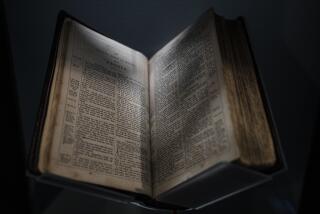What Kind of Books Belong in Classroom?
Re “Is the Good Book Also a Great Book?” Jan. 16:
Dana Parsons apparently disagrees with the idea of teaching the Bible as literature. But to make his point, he uses inflammatory passages from the Koran. I don’t understand why he would have done so; it seems there are equally inflammatory teachings in the Bible about heaven and hell.
But what about passages like this?
“And let me kneel, and let me pray to thee, and let me call Heaven’s blessing on thine eyes ....”
Or how about this one?
“His prayer he saith, this patient, holy man; then take his lamp, and riseth from his knees, and back returneth, meager, barefoot, wan, along the chapel aisle by slow degrees.”
Or what about this one?
“I lift mine eyes, and all the windows blaze with forms of Saints and holy men who died, here martyred and hereafter glorified; and the great Rose upon its leaves displays Christ’s Triumph, and the angelic roundelays.”
All of these passages are from the great poets John Keats and Henry Wadsworth Longfellow. Should we abolish teaching the classics of literature as well lest they lead our children into the knowledge that there are some who believe in more than self?
Chris Ferebee
Corona
*
Making the Good Book a required subject to all students might just open the floodgates for a goodly increase in the rolls of agnosticism and atheism. Today’s children, teenagers and later-to-be young adults, are largely people who more and more choose to become independent free thinkers. Most independent thinkers can see through mythology even though it is taught as a subject in their schools.
Jack C. Caskey
Anaheim
More to Read
Sign up for our Book Club newsletter
Get the latest news, events and more from the Los Angeles Times Book Club, and help us get L.A. reading and talking.
You may occasionally receive promotional content from the Los Angeles Times.






